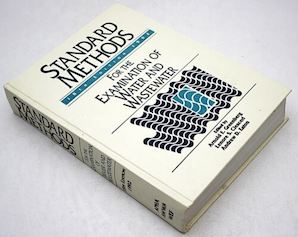
-----
Determination of T.D.S. in water
Please provide information concerning methods for determination of T.D.S in water. How accurate is the method of analysis of T.D.S using conductivity meter? Which ions are detected by this method?
Angela NikolaouAthens, Greece
1999
AWWA

on eBay or Amazon
or AbeBooks
(affil link)
A. Angela, The accuracy of using conductivity to determine TDS depends on the salt content of the water and the factor used. Try to read the pertinent section in the latest edition of
<== 'Standard Methods ...'. My edition is the 15th and the pertinent section is under 104 C (p. 31) Since it is short, I will take the liberty of reproducing it here:
I seem to recall that several years ago we evaporated a sample from rinse bath from our cadmium plating line and found that 0.7 correlated well. We have been using 0.7 for TDS estimates ever since.
Aryeh Asher- Ashkelon, Israel
1999
A. The standard method for the estimation of TDS in water to evaporate a filtered sample in a platinum crucible and heated at 110 or 180 °C up to a constant weight. The temperature of drying should be reported. We have been using this method in the early seventies. As far as the meters are concerned, I agree that for ordinary waters with a cond range of 500-1500, the factor 0.7 is fairly accurate. Pre-calibrated TDS meters in my opinion and according to my experience are not accurate. Because those are calibrated in the factory on NaCl solutions, while natural waters contains many different kinds of ions, having different ionic contributions towards conductance.
Riaz Chaudhary- Lahore, Pakistan
2002
2004
Dear sir,
Q. Here we are suffering from high content of TDS, so please give the method of determination of TDS in water, and also technique for the determination of tds in water hopping for a favorable reply.
Thanking you,
Hemul kumar Vinubhai Patel- Anand, Gujarat, India
Q. My question is " How to determine TDS in Acidic/Basic Solutions."
I require complete information about the technique of determination of TDS in acidic solutions especially.
Thanks,
Associate - Lahore, Punjab, Pakistan
2007
Hello, A.S. It's not quite clear to me what was incomplete in the two previous responses. Please describe your own situation and rephrase your question in terms of the responses and book that have already been introduced. Thanks!

Ted Mooney, P.E.
Striving to live Aloha
finishing.com - Pine Beach, New Jersey
Ted can be retained for immediate
answers or long term project help
2007
Q. We have always determined TDS using the evaporation method which proved to be more accurate than using conductivity meter.Where evaporation is done at 105 °C With the expressive purpose of not attacking soluble organics .Please advise me on the standard drying temperature.
Depending on conductivity, high sulphate, calcium, and magnesium levels, our TDS/conductivity gives a factor of 0.8 to 1.3.Surprisingly whenever the same samples are analysed using a conductivity meter, TDS levels are 1/2 the TDS values obtained by evaporation method; and a factor of 0.55 is obtained. Which method would you recommend for TDS determination?
- Kampala- Uganda
August 19, 2008
Q, A, or Comment on THIS thread -or- Start a NEW Thread